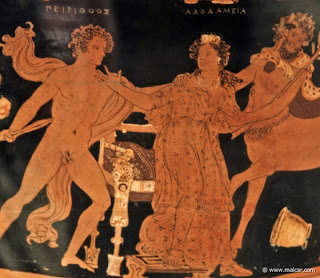After Ajax has scornfully cast Ulysses as the son of Sisyphus (which was a
rumor), that is, a sneaky cowardly fellow who can't be trusted, let alone rewarded with the greatest honor of the Trojan War (the arms of Achilles, the god-crafted, physical embodiment of his glory), Ulysses sums his view of why he, and not Ajax, merits the prize:
tibi dextera bello
utilis, ingenium est, quod eget moderamine nostro;
tu vires sine mente geris, mihi cura futuri;
tu pugnare potes, pugnandi tempora mecum
eligit Atrides; tu tantum corpore prodes,
nos animo; quantoque ratem qui temperat, anteit
remigis officium, quanto dux milite maior,
tantum ego te supero. nec non in corpore nostro
pectora sunt potiora manu: vigor omnis in illis. (13.361-69)
Here's a slightly modified version of Kline's translation:
Your right hand, useful in war, needs the guidance of my intellect (ingenium). You have power (vires) without mind (mente), mine is the care for the future. You can fight, but Atrides, with me, chooses the time to fight. You only display the flesh (corpora), I the spirit (animo: "mind," "soul"). By as much as he who steers the ship is superior to him who rows, by as much as the general exceeds the soldier, by that much I surpass you. No less is the head (pectora: "heart, mind") more powerful than the hand, in our body: the energy of the whole (vigor omnis) is within it.
If Ajax's speech was entirely pragmatic, Ulysses's vocabulary borders on the metaphysical. Part of the irony here is that neither the hand nor the mind is willing to acknowledge the necessity of belonging to a larger whole. Without the mind, a hand is merely an aimless instrument. Without the hand, the mind's strategic powers reside feckless in a vacuum. Execution requires both hand and mind, and the greatest honors are given to artists, athletes, surgeons, craftsmen, etc. who possess and use intelligent fingertips.
In Ovid's scene in
Metamorphoses 13, hand and mind are at war -- so passionate are both to claim the honor of being the sole agent of victorious warcraft that the matter of agency is itself put in question. If we can't agree on which of the executants should be credited, then we can't authoritatively say who did what. When agency is suspended, so is the glory of having acted. The very thing that makes the prize shield and helmet so valuable --
kleos, glory -- has gotten lost, unassignable, thanks to the debate that was supposed to assign it.
Another part of the irony lies in what has caused this fight:
bella movet clipeus - "even his shield makes war," Ovid says. If Ulysses and Ajax have blurred agency, then it's quite possible for the shield to turn into the actual agent of their conflict. Something that is normally considered a tool of war is now its cause. This kind of reversal is a recurrent phenomenon in the
Metamorphoses.
We might argue that this sort of statement -- "the shield makes war" -- is merely a shorthand way of saying that the desires of the two men for the shield and what it represents caused them to fight (and, ultimately, resulted in the suicide of one of them). But it is agency itself that's been put in question. If one cannot decide whether the mind or the hand is acting, then it's equally plausible to say that the shield moved the war as it is to say their desire for the shield was the cause. Agent and instrument can be reversed like cause and effect. When we hear someone say that "_____ made me do it" -- (if you
google that expression, the results are quite interesting), they are entering into a willing suspension, not of disbelief, but of will itself, i.e., of agency.
Ulysses plays with the notion of agency in his speech. While Ajax emphasized how he stood against Hektor while Ulysses was nowhere to be found, Ulysses himself says things like:
Why does Ulysses dare to go through the sentries and commit himself to night; to enter not only the walls of Troy but also the heights of the citadel, past the sharp swords; and to snatch the goddess from her temple, and carry her captive through the enemy ranks? If I had not done it, the son of Telamon would have carried the seven-layered bull’s-hide shield on his left arm in vain. That night the victory over Troy was established: I defeated Pergama then, when I secured the possibility of her defeat.
For Ajax, the practical, direct model of cause and effect is the only model. For Ulysses, war is like a game of chess. A move might not directly cause the end, but indirectly it can be decisive. Once he and Diomedes have stolen the Palladium, "I defeated Pergama." There are actually many more steps before the war is done -- he will, for instance, have to persuade Philoctetes to return, the wounded hero who is
destined to kill Paris with the arrows of Heracles. But Ulysses can elide all those intervening causes and effects, because his strategic actions "established" the fall of Troy.
When the mind dismisses a cause that has to occur because it is only "a" cause, not THE cause, there's a contempt for the hand that's at least equal to the hand's blindness to the role of the mind. Mind and hand are mutually necessary, but also, it seems, incapable of sharing honor and responsibility. They are jealous of their own rights and agencies to the exclusion of each other (Ajax ultimately excludes himself from existing). With the obliteration of agency, instead of history we have mystery.
This framing of the problem of agency might be worth keeping "in mind" as we look at Ovid's approach to the story of Aeneas and the founding of Rome, the new Troy.






.jpg)












